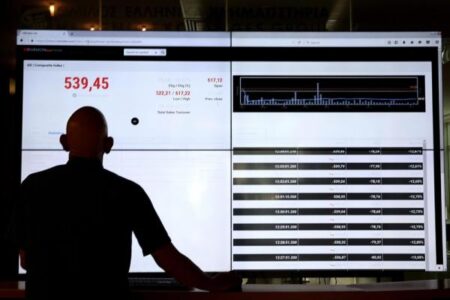By Nora Eckert and Nathan Gomes
DETROIT (Reuters) -General Motors surpassed Wall Street’s expectations in the third quarter, sending its shares up 8% on Tuesday thanks to a resilient consumer demand for its trucks and SUVs.
“The consumer has held up remarkably well for us,” Chief Financial Officer Paul Jacobson said, predicting demand would improve next year as financing rates fall.
The automaker once again boosted its pretax profit forecast for 2024, a relief for investors worried about a potential decline in industry earnings due to still-high interest rates.
But with the U.S. job market holding up well, GM’s sales of gasoline-powered SUVs have remained resilient.
Tuesday’s rally pushed the company’s stock to a two-and-a-half year high as it touched $53.25 in morning trading.
GM said on Tuesday it was on track to deliver between $14 billion and $15 billion in pretax profit, an increase from mid-year’s $13 billion to $15 billion range due to strong pricing and consumer spending.
Its adjusted earnings per share of $2.96 for the quarter outpaced market expectation of $2.43, while revenue of $48.8 billion beat estimates of $44.6 billion.
CEO Mary Barra has been focusing on stability, saying earlier this month that GM’s profit next year is expected to look similar to this year.
GM has said pricing could be softer next year, but it expects results to be supported by cost cuts on SUVs and electric vehicles and improvement in China.
The company is still facing challenges in China, the second-largest world economy, where it posted a loss of $210 million in the first half. GM lost another $137 million in the region in the third quarter and is planning to restructure its operations there.
On a post earnings call with analysts, Barra said GM would hold shareholder and joint venture board meetings in the fourth quarter focused on the division’s operations.
“We really haven’t instituted any of the real restructuring yet,” Jacobson said, adding that sales in the region are up and inventory down.
GM’s stock is up 36% this year, outpacing rivals Stellantis (NYSE:) and Ford Motor (NYSE:), whose share prices have fallen in the same period.
Ford has struggled with costly quality problems and Stellantis witnessed lower sales and revenue in North America after it raised prices and held back on incentives.
THE EV CHALLENGE
Shareholders are queasy about automakers’ EV losses as Chinese rivals pump out affordable electric vehicles abroad and Tesla (NASDAQ:) continues to dominate battery-powered vehicle sales in the U.S.
On its earnings call, GM also reassured shareholders it would work quickly to build an EV that was profitable on a pre-tax basis.
GM offers four EVs in its Cadillac lineup. Barra said EV consideration was “much stronger among luxury customers than the mainstream market”.
CFRA Research analyst Garrett Nelson said GM could lose market share in the near-term due to its lack of hybrid vehicles and free cash flow will be hampered by its capital spend on EV shift.
The Detroit automaker had total capital expenditures of about $2.3 billion in the quarter through Sept. 30, compared with about $2.53 billion a year ago.
Wedbush analyst Dan Ives called GM’s forecast update and results a “large step in the right direction” as the automaker navigates an uncertain market.
Its EV sales have increased every quarter this year as it increases production of models, including the Silverado EV truck and Equinox electric SUV. Still, EVs accounted for just about 4% of GM’s total U.S. deliveries through the third quarter.
While Chinese automakers have not yet penetrated the U.S. market, large automakers like GM see a threat from low-cost and high-tech vehicles, executives have said.
Investors are awaiting more clarity on GM’s autonomous Cruise unit, which has been under scrutiny since one of its robotaxis dragged a pedestrian last year.
The unit posted an operating loss of $400 million for the quarter, smaller than $700 million a year ago. At GM’s investor day earlier this month, Barra said the division would lose no more than $2 billion in 2025.
Read the full article here















